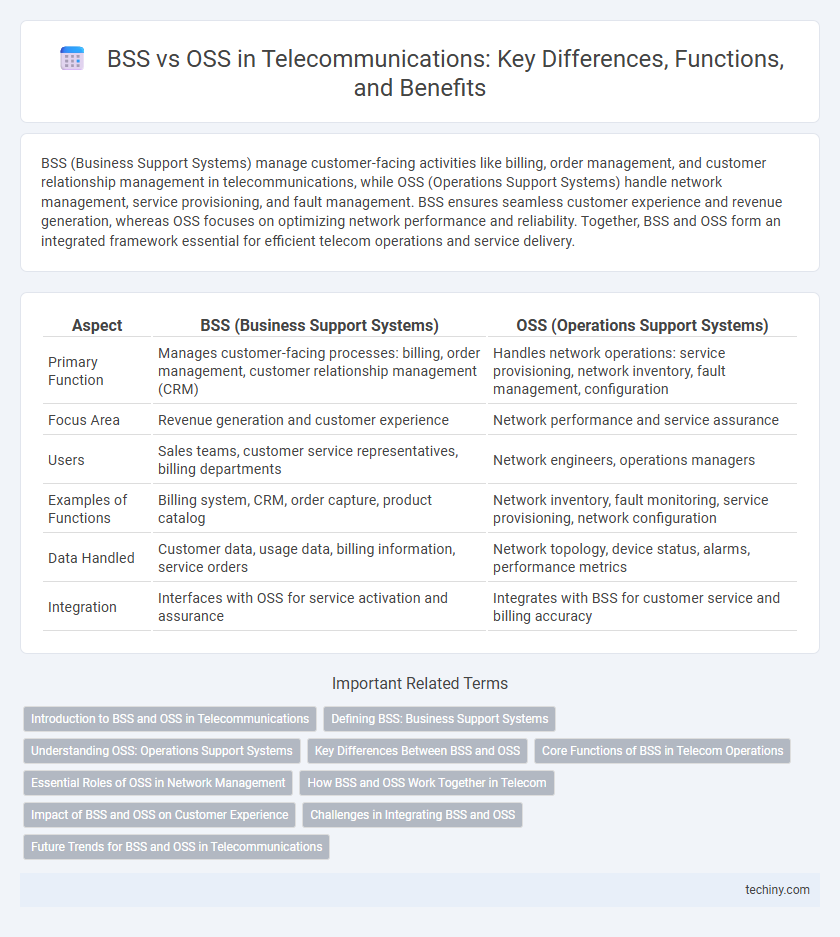BSS (Business Support Systems) manage customer-facing activities like billing, order management, and customer relationship management in telecommunications, while OSS (Operations Support Systems) handle network management, service provisioning, and fault management. BSS ensures seamless customer experience and revenue generation, whereas OSS focuses on optimizing network performance and reliability. Together, BSS and OSS form an integrated framework essential for efficient telecom operations and service delivery.
Table of Comparison
| Aspect | BSS (Business Support Systems) | OSS (Operations Support Systems) |
|---|---|---|
| Primary Function | Manages customer-facing processes: billing, order management, customer relationship management (CRM) | Handles network operations: service provisioning, network inventory, fault management, configuration |
| Focus Area | Revenue generation and customer experience | Network performance and service assurance |
| Users | Sales teams, customer service representatives, billing departments | Network engineers, operations managers |
| Examples of Functions | Billing system, CRM, order capture, product catalog | Network inventory, fault monitoring, service provisioning, network configuration |
| Data Handled | Customer data, usage data, billing information, service orders | Network topology, device status, alarms, performance metrics |
| Integration | Interfaces with OSS for service activation and assurance | Integrates with BSS for customer service and billing accuracy |
Introduction to BSS and OSS in Telecommunications
Business Support Systems (BSS) in telecommunications manage customer-facing activities such as billing, order management, and customer relationship management (CRM), ensuring seamless interactions and revenue assurance. Operations Support Systems (OSS), on the other hand, handle network management, service provisioning, and fault management to maintain operational efficiency and service quality. Integrating BSS and OSS enables telecom operators to deliver consistent customer experiences while optimizing network performance and operational workflows.
Defining BSS: Business Support Systems
Business Support Systems (BSS) in telecommunications manage customer-facing activities such as billing, order management, and customer relationship management (CRM). BSS ensures accurate revenue generation by handling subscriptions, invoicing, and payment processing efficiently. These systems integrate with Operational Support Systems (OSS) to streamline service delivery and enhance overall customer experience.
Understanding OSS: Operations Support Systems
Operations Support Systems (OSS) in telecommunications manage network operations, service provisioning, and fault management to ensure seamless service delivery. OSS integrates functions such as network inventory, configuration management, and performance monitoring to optimize network reliability and efficiency. Effective OSS deployment enhances operational agility, reduces downtime, and supports automated workflows across complex telecom infrastructures.
Key Differences Between BSS and OSS
BSS (Business Support Systems) manage customer-facing activities such as billing, customer relationship management, and order fulfillment, while OSS (Operations Support Systems) focus on network management, service provisioning, and fault management. BSS handles revenue generation and customer experience, whereas OSS ensures network performance and service availability. Key differences include their operational scope--BSS aligns with business processes, and OSS with technical infrastructure management.
Core Functions of BSS in Telecom Operations
Business Support Systems (BSS) in telecommunications manage customer-facing activities such as billing, order management, customer relationship management (CRM), and revenue assurance. These core functions ensure accurate charging, service activation, and effective customer interactions, driving revenue generation and retention. BSS seamlessly integrates with Operations Support Systems (OSS) to enable efficient service delivery and network management.
Essential Roles of OSS in Network Management
Operations Support Systems (OSS) are critical for network management in telecommunications by enabling real-time network monitoring, fault management, and performance optimization. OSS handles service provisioning, configuration management, and inventory tracking, ensuring network resources are efficiently utilized and potential issues are proactively resolved. These systems provide the backbone for maintaining network reliability and supporting scalability, directly impacting service quality and operational efficiency.
How BSS and OSS Work Together in Telecom
BSS (Business Support Systems) manages customer-facing activities such as billing, order management, and customer relationship management, while OSS (Operations Support Systems) handles network management, service provisioning, and fault management in telecom networks. Together, BSS and OSS integrate data flows to ensure seamless service delivery, optimize resource allocation, and enhance customer experience. Effective coordination between BSS and OSS streamlines operational workflows and supports real-time decision-making in telecommunications service management.
Impact of BSS and OSS on Customer Experience
BSS (Business Support Systems) and OSS (Operational Support Systems) critically influence customer experience in telecommunications by streamlining service delivery and billing accuracy. BSS enhances customer satisfaction through efficient order management, billing, and customer relationship management, ensuring seamless interaction with telecom services. OSS supports backend network operations such as service provisioning and fault management, minimizing downtime and improving network reliability, which directly benefits customer service quality.
Challenges in Integrating BSS and OSS
Integrating Business Support Systems (BSS) and Operational Support Systems (OSS) presents challenges due to disparate data models, legacy system incompatibilities, and real-time synchronization requirements. Service providers face difficulties ensuring seamless interaction between customer-facing processes managed by BSS and network operations handled by OSS. Achieving unified workflows requires overcoming complex system integrations, data consistency issues, and alignment of business and technical objectives.
Future Trends for BSS and OSS in Telecommunications
Future trends in telecommunications emphasize the integration of BSS (Business Support Systems) and OSS (Operations Support Systems) through AI-driven automation, enabling real-time analytics and enhanced customer experience. Cloud-native architectures and microservices will drive agility and scalability, supporting rapid service deployment and efficient network management. The adoption of 5G and IoT requires BSS/OSS evolution to handle complex billing, orchestration, and service assurance across diverse, high-speed networks.
BSS vs OSS Infographic

 techiny.com
techiny.com